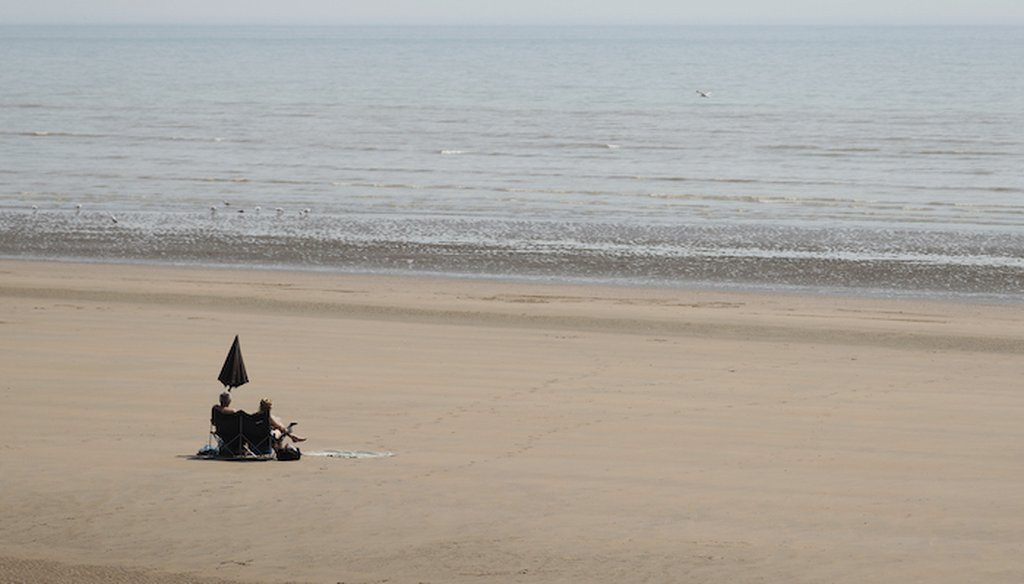Stand up for the facts!
Our only agenda is to publish the truth so you can be an informed participant in democracy.
We need your help.
I would like to contribute

Right now, health officials say the COVID-19 virus can be transmitted in all areas, including places with hot and humid weather, and recommend that people adopt protective measures, regardless of climate. (Associated Press file photo)
If Your Time is short
-
While the seasonal flu typically weakens during summer months, medical experts say they don’t know if COVID-19 will behave the same way, since the strain is so new.
-
According to new research from Europe, high reproductive numbers of the novel coronavirus were observed in dry, cold areas as well as tropical areas with high humidity.
-
Experts warn people to not count on the weather, but say it’s possible COVID-19 infections may slow in the summer for various reasons, including built-up immunity and the results of social distancing.
As the COVID-19 pandemic rages on around the world, people are grasping for any sign that an end is in sight.
One popular ray of hope: warm weather. After all, the seasonal flu and milder strains in the coronavirus family tend to spike in winter and dwindle in spring.
Will the novel coronavirus also work that way? Experts say don’t get your hopes up.
What experts are saying
New research out of Europe suggests the pandemic may not simply vanish in the summer months, and medical experts say the virus is too new, and it’s too early in the season, to determine how it’s affected by weather and climate.
This strain appeared in China only at the end of 2019, and health experts say there’s still not enough known about what the virus will do over the course of a season.
Dr. Anthony Fauci, director of the National Institute of Allergy and Infectious Diseases and member of the White House coronavirus task force, says it’s possible that the virus will suffer in the heat, but warns people not to count on it.
In a March 26 conversation on Instagram with basketball star Steph Curry, Fauci said yearly viruses like the seasonal flu and other coronaviruses that are typically more benign tend to do poorly in warm, moist weather and well in cold, dry weather.
"That’s one of the reasons why, in addition to the fact that in the warm weather you’re more outside and not confined in a room, that these kinds of respiratory viruses tend to go down as you get into the summer months," Fauci told Curry. "The only issue is we don’t know whether this is going to happen with this virus, because this is the first time we’ve ever dealt with this virus. So it’s not an unreasonable assumption to think that it’s going to go down, but you don’t want to count on it."
New research from Europe indicates the novel coronavirus may be tougher to beat than other viruses that weaken in warm weather.
The March 25 report from the European Centre for Disease Prevention and Control explains that other strains of the coronavirus cause about 10% to 15% of common colds and peak between December and April, but are hardly detected in the summer months. Scientists say that’s because these viruses are more stable under low or midrange humidity. Drier conditions suppress the respiratory system’s defense mechanisms, making it harder to fight off viruses and infections.
But some evidence from China suggests that there’s no clear link between weather or climate and the viability of the COVID-19 virus, which scientists call SARS-CoV-2. According to preliminary research, high reproductive numbers of the virus were observed in both dry, cold areas as well as tropical areas with high humidity, such as the Guangxi region of China and Singapore.
"There is no evidence to date that SARS-CoV-2 will display a marked winter seasonality, such as other human coronaviruses in the northern hemisphere, which emphasizes the importance of implementing intervention measures such as isolation of infected individuals, workplace distancing, and school closures," the European report says.
The importance of measures like isolation and social distancing was echoed by Harvard epidemiologist Marc Lipsitch. Some people have pointed to the summer ebb of the 2002-03 SARS epidemic as evidence that the novel coronavirus may do the same, but Lipsitch says weather had little to do with its demise.
"SARS didn’t die of natural causes," he wrote in a recent article. "It was killed by extremely intense public health interventions in mainland Chinese cities, Hong Kong, Vietnam, Thailand, Canada and elsewhere."
Lipsitch also says medical experts expect that, as a new virus to humans, COVID-19 "will face less immunity and thus transmit more readily even outside of the winter season."
So, we could see an ebb in the virus as summer approaches, but the reason could be a mixture of the weather, built-up immunity and the result of social-distancing efforts. And because the virus is so new, experts stress that we may not see it dissipate as fast as we would like.
Right now, health officials say the COVID-19 virus can be transmitted in all areas, including places with hot and humid weather, and recommend that people adopt protective measures, regardless of climate.
Our Sources
European Centre for Disease Prevention and Control, Coronavirus disease 2019 (COVID-19) pandemic: increased transmission in the EU/EEA and the UK – seventh update, March 25, 2020
Instagram, Steph Curry Q&A with Dr. Anthony Fauci, March 26, 2020
WHO press conference, COVID-19, March 5, 2020
Harvard School of Public Health, Seasonality of SARS-CoV-2: Will COVID-19 go away on its own in warmer weather?, Accessed March 27, 2020
World Health Organization, Coronavirus disease (COVID-19) advice for the public: Myth busters, Accessed March 27, 2020










































